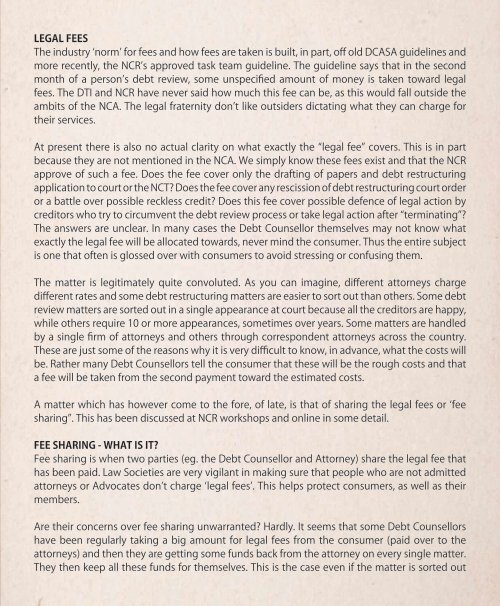Debtfree DIGI Magazine - May 2016
Debtfree DIGI - SA's Free Debt Counselling and Debt Review industry magazine. News & articles all about debt review and the Debt Review Awards which are currently under way.
Debtfree DIGI - SA's Free Debt Counselling and Debt Review industry magazine. News & articles all about debt review and the Debt Review Awards which are currently under way.
You also want an ePaper? Increase the reach of your titles
YUMPU automatically turns print PDFs into web optimized ePapers that Google loves.
LEGAL FEES<br />
The industry ‘norm’ for fees and how fees are taken is built, in part, off old DCASA guidelines and<br />
more recently, the NCR’s approved task team guideline. The guideline says that in the second<br />
month of a person’s debt review, some unspecified amount of money is taken toward legal<br />
fees. The DTI and NCR have never said how much this fee can be, as this would fall outside the<br />
ambits of the NCA. The legal fraternity don’t like outsiders dictating what they can charge for<br />
their services.<br />
At present there is also no actual clarity on what exactly the “legal fee” covers. This is in part<br />
because they are not mentioned in the NCA. We simply know these fees exist and that the NCR<br />
approve of such a fee. Does the fee cover only the drafting of papers and debt restructuring<br />
application to court or the NCT? Does the fee cover any rescission of debt restructuring court order<br />
or a battle over possible reckless credit? Does this fee cover possible defence of legal action by<br />
creditors who try to circumvent the debt review process or take legal action after “terminating”?<br />
The answers are unclear. In many cases the Debt Counsellor themselves may not know what<br />
exactly the legal fee will be allocated towards, never mind the consumer. Thus the entire subject<br />
is one that often is glossed over with consumers to avoid stressing or confusing them.<br />
The matter is legitimately quite convoluted. As you can imagine, different attorneys charge<br />
different rates and some debt restructuring matters are easier to sort out than others. Some debt<br />
review matters are sorted out in a single appearance at court because all the creditors are happy,<br />
while others require 10 or more appearances, sometimes over years. Some matters are handled<br />
by a single firm of attorneys and others through correspondent attorneys across the country.<br />
These are just some of the reasons why it is very difficult to know, in advance, what the costs will<br />
be. Rather many Debt Counsellors tell the consumer that these will be the rough costs and that<br />
a fee will be taken from the second payment toward the estimated costs.<br />
A matter which has however come to the fore, of late, is that of sharing the legal fees or ‘fee<br />
sharing”. This has been discussed at NCR workshops and online in some detail.<br />
FEE SHARING - WHAT IS IT?<br />
Fee sharing is when two parties (eg. the Debt Counsellor and Attorney) share the legal fee that<br />
has been paid. Law Societies are very vigilant in making sure that people who are not admitted<br />
attorneys or Advocates don’t charge ‘legal fees’. This helps protect consumers, as well as their<br />
members.<br />
Are their concerns over fee sharing unwarranted? Hardly. It seems that some Debt Counsellors<br />
have been regularly taking a big amount for legal fees from the consumer (paid over to the<br />
attorneys) and then they are getting some funds back from the attorney on every single matter.<br />
They then keep all these funds for themselves. This is the case even if the matter is sorted out


















